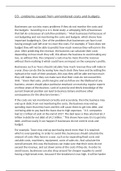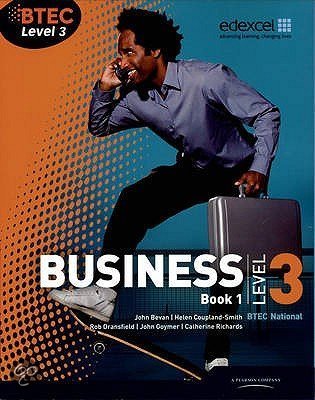D3 - problems caused from unmonitored costs and budgets
Businesses can run into many problems if they do not monitor the costs and
the budgets ‘’According to a U.S. Bank study, a whopping 82% of businesses
that fail do so because of cash flow problems.’’ Most businesses fail because of
not budgeting and not monitoring the costs and budgets, which shows how
important budgeting is. One of the problems that businesses can face is not
having enough cash left over to cover the costs. For example, if Tesco does not
budget they will not be able to predict how much revenue they will earn in the
year. After predicting the revenue, the business can calculate their costs
depending on how much they will, this allows the business to avoid making any
loss, so without this, the company’s costs may be more than the revenue
without them realising it which could have an impact on the company’s profits.
Businesses such as Tesco should calculate how much revenue they will make in
a year, they can do this by seeing how much stock they have and by setting the
right price for each of their products, this way they will be able see how much
they will make, then they can make sure that their costs do not exceed this
limit. ‘’Given that sales, profit margins and cash flow are the lifeblood of any
business, owners should place particular emphasis on receiving regular reports
on these areas of the business. Lack of a precise and timely knowledge of the
current financial position can lead to business failure and have other
consequences for the directors/owners.’’
If the costs are not monitored correctly and accurately, then the business may
end up in debt, from not monitoring the costs, the business may end up
spending more than they have and this will cause them to get into debt, and
not being able to pay back the loans due to high expenses. ‘’U.S. companies
had $2.1 trillion of cash at the end of 2017. The bad news is they also had $6.3
trillion in debt for net debt of $4.2 trillion.’’ This shows how easy it is to get into
debt, and how easily it can happen if businesses do not control costs and
budget.
For example, Tesco may end up purchasing stock more than it is required,
which is overspending. In order to avoid this, businesses should calculate the
amount of costs they have in a year, such as by separating fixed costs and
variable costs, machinery, equipment, costs of sales etc. And calculate the
overall amount, this way the business can make sure that their costs do not
exceed the revenue, and cut down some of the costs if they do. In order to
avoid issues, businesses can also shop around for cheaper supplies to avoid
having a high break even, because if the breakeven is too high, it will be harder





